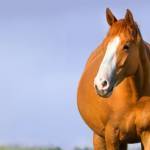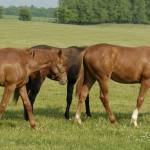Changes in Mineral Levels in Saliva May Pinpoint Gastric Ulcers

Diagnosing equine gastric ulcer syndrome (EGUS) using biomarkers in saliva is not a new idea but one that has yet to come to practical fruition. Taking another run at salivary biomarkers, veterinary researchers found the minerals zinc, magnesium, and iron may be able to help diagnose EGUS, particularly glandular disease.*
EGUS occurs frequently in horses and requires sedated, fasted horses to undergo gastroscopy to visualize the stomach lining. Ulcers can be identified in either the squamous (upper) or glandular (lower) regions of the stomach, and oftentimes both.
“In squamous disease, the wall of the stomach is damaged due to increased exposure to the stomach acid. In glandular disease, however, the mechanisms leading to ulceration are unclear but may result from a failure of the stomach wall’s natural defense systems to protect against the constant acid exposure,” said Kathleen Crandell, Ph.D., a Kentucky Equine Research nutritionist.
In humans and other animals, minerals have been linked to gastric ulcers and are used to help treat this condition. For example:
- Zinc reportedly has a protective effect on the gastric mucosa (lining), and zinc deficiency is associated with gastric ulcers;
- Zinc treatment reduced the incidence of ulcers in rats induced by stress or acid accumulation;
- In humans, zinc sulfate helped reduce ulcer size;
- Magnesium is an important ingredient in antacids in humans; and
- Magnesium is believed to protect the stomach by decreasing the amount of acid secretion by decreasing the function of the acid-producing parietal cells.
To determine if these minerals differed between healthy horses and those with EGUS—glandular, squamous, or both—veterinarians evaluated horses at the University of Copenhagen’s Large Animal Teaching Hospital. Saliva was collected from horses that underwent gastroscopy and were diagnosed with gastric ulcers. In addition, healthy horses presenting for elective surgeries such as castration with no evidence of gastric ulcers were also included.
Saliva was collected using a sponge that all horses were allowed to gently chew on for one to two minutes until moist. Those sponges were then processed, and the minerals measured by validated laboratory procedures.
Eighty horses were included in the study, including 16 healthy animals. Twenty-three horses had squamous disease only, 20 had glandular disease only, and 21 had both squamous and glandular disease.
“Zinc, magnesium, and iron levels were also significantly lower in saliva from horses with glandular disease compared to healthy horses. Iron levels were also significantly lower in saliva from horses with squamous disease compared to healthy horses,” Crandell described.
Exact reasons why these minerals are lower remains to be determined but may be partially explained by decreased absorption.
“Although we know little about the pathophysiology of glandular disease, looking at zinc more closely may help unravel the mechanisms behind glandular dysfunction,” said Crandell.
She added, “Zinc appears to play a role in prostaglandin production, and prostaglandins play a crucial role in safeguarding the glandular gastric lining. Prostaglandins regulate blood flow, mucus and bicarbonate secretion, and acid production.”
Despite finding lower salivary levels of zinc, magnesium, and iron in horses with gastric ulcers, Crandell warned, “We are still a long way from completely understanding the mechanisms of glandular disease, which means additional research is necessary before translating that to recommendations for supplementing minerals.”
Currently, administering omeprazole to suppress acid production by the stomach is the mainstay of therapy for both squamous and glandular disease. Nutrition, however, plays an important role in managing EGUS.
Crandell said, “With indications that omeprazole may interfere with the absorption of zinc during treatment, offering supplemental minerals may compensate for inadequacies. Look for research-proven digestive supplements that contain a combination of fast-acting antacids and coating agents that quickly and effectively protect the sensitive stomach lining, preventing the damage caused by the continuous production of gastric acid.”
Triacton, which contains an array of minerals for bone and digestive health, would also be appropriate.
*Muñoz-Prieto, A., J.J. Cerón, and F. Tecles. 2024. Measurement of trace elements (zinc, copper, magnesium, and iron) in the saliva of horses: Validation data and changes in equine gastric ulcer syndrome (EGUS)(opens new window). Animals (Basel) 14(12):1724.








